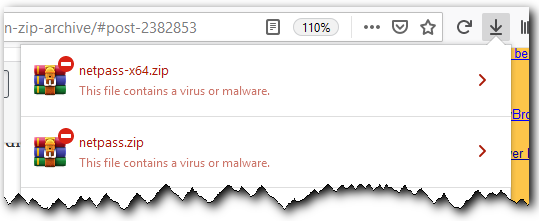29 november 2020 I downloaded “Nirsoft Network Password Recovery“, just in case I would ever need it.
Just this last night I ran a full scan of Microsoft Defender Antivirus and, for a minute, got the scare of my 37-year computer life.
Defender reported detection of Ransom:PowerShell/Roduk detected in
G:\Installers\Nirsoft Network Password Recovery\netpass-x64.zip .
As fortunately the alleged infection was dormant in a compressed archive and I NEVER unpacked nor ran it (I’m quite sure about that), I assume the ransomware was never activated.
Windows Defender removed the infected archive. Well, good riddance and kudos to Windows Defender.
All’s well that ends well! ![]()
1 Laptop Win 10
Both tweaked to look, behave and feel like Windows 95
(except for the marine blue desktop, rgb(0, 3, 98)






